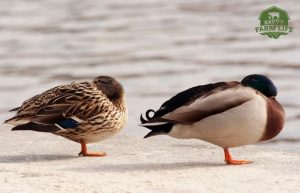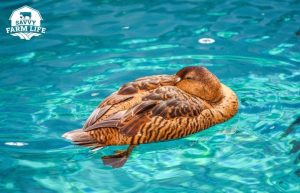
What You Need to Know About How Ducks Sleep
Ducks, like all other animals, must sleep in order to regain energy lost through the day’s activities, whether that be feeding, swimming, flying, foraging, or anything else a duck would do. Sleep deprivation even impact ducks just as it would humans. Understanding how and where ducks sleep can help you to better care for your flock and provide them with the facilities needed to give them comfort for nap time.
Where do ducks sleep? Ducks, due to their inconsistent sleeping patterns and semi-nocturnal nature, tend to be flexible sleepers. This means that they can sleep on the water and on land, depending on the breed of duck and the environment they choose to roost in.
In essence, ducks sleep where they can when they can. They will often sleep around other ducks so that at least one duck can be watching over the rest as they sleep. In this article, I’ll tell you everything you need to know about how and where ducks sleep! Let’s dive in.
Duck Sleeping Habits
Ducks by nature are prey birds, meaning they have a wide variety of predators, like foxes and coyotes. Sleeping, thus, puts a duck in an inherently vulnerable position.
To combat potential attacks while sleeping, ducks have a variety of defense mechanisms that they employ, one of these being the location of where they sleep.
Where Do Ducks Sleep?
Duck sleeping locations can vary depending on the weather conditions and potential threats. For instance, ducks like to bask in the warm sun on nice days, so they may choose to nap on a rock or near a lake to maximize their sun exposure. When it’s cold, it’s more advantageous for a duck to find shelter in the form of a cave or small, natural enclosure, like a coop. This protects them from high winds and cold temperatures.
Other duck breeds prefer to sleep exclusively in the water. They simply set up on top of the water and use their light weight to float while they fall asleep in a comfortable position. Sleeping on top of the water proves beneficial at night as the stillness of the water’s surface indicates no potential threats.
As soon as the peacefulness is broken, due to a ripple on the surface or movement under the water, the sleeping duck is alerted to the potential threat. Some breeds, like Mallard ducks, prefer to exclusively sleep in the water due to the extra layer of protection it provides against threats.
Muscovy ducks, on the other hand, exclusively roost in trees at night to avoid predators that cannot fly high distances. To learn more about how high ducks can fly, how they fly, and more, check out my previous article “Can Ducks Fly? Ultimate Duck Flight Guide”.
While most ducks are versatile sleepers, differing sleeping environments, like that of the Muscovy versus the Mallard, come down to mostly individual preference.
How Ducks Sleep to Stay Warm
 You may be wondering, how do ducks survive in cold temperatures? How do they conserve body heat during all seasons?
You may be wondering, how do ducks survive in cold temperatures? How do they conserve body heat during all seasons?
Well, like all birds, a duck’s feathers provide them with natural insulation to brave extremely cold temperatures. The feathers act similarly to a down jacket, in that there are pockets of air in between them to provide extra insulation to the duck in question. Being of the waterfowl category of bird, they much prefer to be too cold than too warm. Some ducks will even sleep on top of a frozen body of water over the ground in the wintertime!
Their ability to handle the cold is not entirely due to feathers alone, however. Ducks sleep in positions that maximize their conservation of body heat, allowing them to act as their own personal heaters.
One position that is guaranteed to keep a duck warm is sleeping with one foot on the ground and one foot tucked into their feathery body. This balancing act has more purpose than it appears, as it allows the duck to keep half of their coldest extremities inside the warmth of their feathers. One foot up is equal to one less foot freezing on the ground.
In addition to this, ducks will also tuck their bills into the backs of their feathers. The same logic that applies to keeping their leg up applies here: a duckbill has no feathers, and, therefore, no insulation. By prioritizing this part of their body to keep warm, they are maximizing their conservation of internal body heat.
To learn more about things you can do to help your ducks stay warm in the winter, visit my article Do Ducks Get Cold? Essential Care Guide.
Ducks Sleep in a Row
Being prey birds, ducks are always safer when they travel in packs than when they travel alone. This also applies to their sleeping habits. Oftentimes, ducks will sleep in a row with other ducks, both to conserve heat and provide a unified front against attackers.
When sleeping in a row, ducks have a very specific formation that they tend to gravitate towards. They have “guard ducks” on each end who use unihemispheric sleeping to warn the fully asleep ducks of potential threats.
Ducks Use Unihemispheric Sleeping
What is unihemispheric sleeping? Unihemispheric sleeping enables ducks to stay on guard even during rest. This means that a duck can control the functions of its brain to the point of shutting one portion off for resting while keeping another portion on guard.
This translates to ducks literally “sleeping with one eye open.” That’s right, when ducks sleep in a unihemispheric way, they keep one eye (and one side of the brain) open and awake at all times. This allows them to detect potential threats even while resting, which is really cool if you ask me.
When ducks sleep in a row, there are two ducks on either end of the line that sleep with one eye open, then the rest of the ducks, in the middle, sleep fully, or with both eyes shut. Scientists, during experiments, have even changed individual duck’s positions within the line to see if this affects which ducks “guard” the pack. Spoiler alert: it doesn’t. Ducks at the end of a row always sleep with one eye open while the ducks in the middle are able to sleep fully.
When Do Ducks Sleep?
Ducks tend to sleep rather inconsistently. They are semi-nocturnal, which means that they typically nap for part of the night, then wake up to feed or fly the rest of the night.
Some ducks even prefer to migrate short distances at night, meaning that they get most of their sleep during the day. These sporadic sleeping patterns may confuse you, so let me explain more in-depth.
During the day, sleeping is tightly intertwined with the process of grooming. Several times a day, a duck will preen its feathers, groom itself, then lay down to get some shut-eye. Sleeping is not a stand-alone activity; it is integrated with other parts of the duck maintenance process.
Ducks will typically take several shorter naps a day, all complete with grooming beforehand, to evade potential threats and minimize the amount of time they are vulnerable for. These naps lend themselves to a duck’s semi-nocturnal nature by allowing the duck to sleep in small increments during the day, instead of all at once at night.
Do My Ducks Need a Coop to Sleep In?
When I first got ducks, I was surprised how little they used the coop we had built them. Instead, I would see them nesting and even sleeping around the yard. Every now and then I would walk out to find an egg had been laid in the middle of the lawn! While the coop was an option for the ducks at night, I seldom saw them go in it, and unfortunately, they started getting picked off by predators. I learned quickly that we had to figure something else out.
While chickens will naturally return to the safety of a coop for the night, ducks won’t, and this can be due in-part to their semi-nocturnal nature. However, if you want to keep your ducks safe, you can teach them to return to a coop and next at night. Ducks typically prefer to make their own nests or sleeping areas and they like to nest on the ground, so you don’t need to provide your flock with roosting boxes or pre-made nests. Simply place the straw all over the bottom of your enclosed shelter and let the ducks do their thing!
Since ducks will usually feed at night, you can place a feeding dish and a waterer in your duck coop. This way, the ducks can stick to their routine and have the ability to go about normal practices.
To ensure your ducks are comfortable in their coop in the winter, simply provide them with extra straw or bedding in their shelter. Make sure that there is proper ventilation in the shelter, as well, because if there’s not, moisture can very easily build up in the shelter at night. Excess moisture in the air can affect a duck’s respiratory system, increasing its risk of infections or lung disease.
To learn more about training your ducks to return to a coop, check out my article Do Ducks Need a Coop: What You Need to Know.
